- Home
- M. D. Lachlan
Wolfsangel c-1 Page 3
Wolfsangel c-1 Read online
Page 3
The gods, however, had been much closer in her life.
3
Night Caller
The mother’s name was Saitada and she had been very beautiful, sold as a young child when she was captured from her own people. Then her name had been Badb. As she had grown she had attracted the sexual attention of her owner — a smith. He was a generous man and liked to share her with his friends. At the age of thirteen she had cursed her good looks, taken a hot iron from the forge and applied it to her face.
The smith had been furious. He had tried to beat her but for some reason couldn’t bring himself to do it. He wanted to hold her, to kiss her, tell her he would make things all right, but he knew the girl would never come near him any more except by force. For as long as he’d owned her he had been convinced there was some bond between them — that despite her tears and her protestations, her eventual sullen withdrawal, that she felt something for him, even that he was special to her. There on her face he confronted the damage he had done and, as a coward, could not bear to look at it in his home. So he’d just taken her to market. Though she had been delirious with pain from her wound, she remembered that place, where she had stood alongside goats and pigs in the shit and the stink to be prodded and inspected and sold on.
‘This one,’ said the farmer’s wife, who could have been mistaken for an upright pig in the wrong light. ‘This one I think is very suitable.’
The farmer, whose advancing years had neither increased his discernment nor reduced his lust, had been delighted. If he positioned her right then he would have a rare beauty to enjoy. Then he had looked into that eye and the idea had seemed impossible. He felt bad for having had such lewd thoughts and took pity on the girl.
‘Yes,’ he said, ‘she will make a fine maid.’
They had asked her what she was called and she, wishing to leave the sullied little girl with the pretty face behind, had chosen another of her people’s names. Saitada.
The farmer’s wife had picked her for her horrible looks, fearing to lose her husband’s affections to a prettier girl. The wound, she knew, would not put a man off because a man in passion is a beast that no small deformity can deter. It was the bloody eye that seemed to look through you and expose your sins to shame that would keep her husband true. No man, she thought, could have that look upon him and feel his misdeeds would go unpunished.
The farmer’s wife was a healer and had dressed and cared for the girl’s wounds with presses of comfrey and chamomile. Lacking children of her own, she lavished attention on her, combed and plaited her hair, made her a pretty dress and even gave her a bed. Saitada was as happy there as she had ever been, though she swore she would never take another man. And she never did, until she was seventeen.
On the day that she was to go back on that vow a neighbouring farmer had visited to warn that, very unusually, there was a wolf in the area. Three of his sheep had been killed the night before. In such a tight community of small farms wolves were rare, put off by the number of men. Hence the local farmers had little experience of dealing with them.
So Saitada, the farmer and his wife drove their livestock into the pen by the pigsty and waited the night with the dogs and a spear. You have two ways to go with a wolf, unless you are an experienced trapper. One is to light your torches and sing your songs, hoping that the noise will drive him away. The second is to lie in wait to spear him and kill him. Neither will work but both courses of action will provide the comfort of doing something. If you come in force he will slip away and try again tomorrow. If you wait, he can wait longer, until you are tired and sleep takes you. To catch a wolf, you need a trick and a trap, things the farmer did not have.
The farmer was eager for sleep and wanted to get things over with, so he commanded silence from the women. Still, he could not quite keep quiet himself, so impressed was he with the weight of his spear. Men who have never had to fight love a weapon. They love to hold it in their hands, feel its balance and speculate on the damage they might do, were they called to do it. There is a killer in every cowardly man, waiting for the right set of circumstances when the time has been drained of the possibility of reprisals and he feels free to act. The farmer was no different and began, as he sat in the warm night, to feel the importance the spear bestowed upon him and, despite himself, to talk.
‘When I was a boy it was said no one threw a spear better than I.’
The farmer’s wife rolled her eyes because she had heard this story before many times when he was in drink.
‘I thought we were being quiet for this wolf,’ she said.
‘I’m just saying,’ said the farmer, ‘had I been born higher I would have made a mighty warrior. As a boy I had quite the feel for weapons. The earl himself saw me one day and said he wished half his warriors could shoot a bow as well as I. I was quite the-’
Suddenly he was quiet. In the trees by the farm two gigantic eyes seemed to burn, less a wolf than some fiend from hell.
He moved smoothly behind the slave girl. She did not flinch, having endured worse than a wolf had to offer her.
‘That is no ordinary wolf,’ said the farmer’s wife.
‘Sound the alarm,’ said the farmer. ‘Fetch aid, fetch aid!’
‘You fetch aid,’ said his wife; ‘you’re the man.’
‘If I move it might see me,’ hissed the farmer.
‘If I move it might see me,’ hissed his wife.
‘I am needed to till the land. Who will provide for poor Saitada?’ said the farmer.
‘I will go for aid,’ said Saitada.
‘Too late. The wolf is among you,’ said a voice close at their ears.
The three turned but couldn’t for a moment see anyone. Suddenly, so bright and white in the starlit night that they wondered how ever they could have missed him, a young man of around twenty was there. He was strikingly handsome, long-legged and lithe. He seemed to draw the moonlight to him, and beneath it his muscles rippled as if under some silvery sea. For a breath it didn’t seem remarkable that he was almost completely naked. All he had to cover his modesty was a huge and bloody wolfskin draped across his back, a rear paw cheekily positioned by his hand over that part the nuns shun. His hair was bright red and stood up in a shock.
‘Christ’s wounds!’ said the farmer. ‘You nearly made me jump out of my skin.’
‘Well, I did jump out of mine,’ said the man, sliding away the paw that concealed his shame and then whipping it back again.
‘How dare you appear in front of my wife like that!’ said the farmer, who was a pious man when it suited him.
‘The wolf behind you?’ said the strange man.
‘Where?’ said the farmer. ‘Oh Lord, the eyes.’
The farmer turned to run but he had those grim burning eyes in front of him in the wood and the strange and terrible young man behind. He had nowhere to go and, his brain running out of ideas for what to do with his body, he simply flopped to the floor.
‘Not eyes,’ said the man, ‘just torches left by some kind traveller.’
The farmer squinted into the darkness. Now it was obvious: they were just brands.
‘As I thought,’ said the farmer.
‘Fire,’ said the pale man. ‘That is the way to keep the wolf at bay.’ He walked to the wood and returned with the two burning torches. Now he had tied the wolf skin’s back paws around his midsection.
‘I have covered that serpent that tempted Eve,’ he said.
The man held the torches up and looked at the peasants. ‘A farmer, his pretty piggy wife and who is this rare beauty? No wonder you panic, old man, to see such a face.’
‘I wasn’t panicking I was… taking advantage of the terrain, that is why I got down.’
‘It seems this one knows better than you that fire keeps the wolf at bay,’ said the man, holding up his hand to Saitada’s chin and studying the scar on her face.
Saitada did not flinch to hear his words because the scorn of a man meant nothing to her. He gently turn
ed the undamaged side of her face towards him.
‘Such beauty is a terrible thing,’ said the man, ‘for no shield can deflect its dart, and even the most nimble of warriors can no more dodge it than you can, old man.’
‘You are mocking me,’ said Saitada, ‘but I am glad of it if it means you will not lay your hands upon me.’
‘No, lady,’ said the man. ‘You are far more beautiful to me than any woman on earth. You have snatched the spool of destiny from the hands of the fates and woven a skein yourself. ’
‘You speak fine words, sir,’ said the farmer.
‘High praise from such a judge,’ said the traveller with a bow.
‘And now you’re mocking me!’ said the farmer, who like most old men tended to hear only those parts of the conversation that concerned himself. ‘I once threw a spear the length of a laine. And it stuck in the mud properly too.’
‘Don’t worry, ma’am,’ said the man to the farmer’s wife. ‘I shall mock you when I have finished with your husband, but, oh, shall I ever finish with such an example? No, ma’am, you are quite safe, I shall never finish with him.’
‘What of that wolf?’ said the farmer, whose head had become a little disordered since the stranger’s appearance, though he had drunk little.
‘I have slain that night-time caller, that freeman of the forests, that furry sir, oh farmer, my manure mangler, my seedy serf, my shit smith. But he tore my clothes,’ said the man. ‘Will you lend me some of yours so that I might cover the splendour the priests would call our shame?’ He went to pull the wolf skin away but stopped at the last instant.
‘If you have killed the wolf, as I see you have, then I owe you a cloak,’ said the old man. ‘Here in the house I have one that has served me many winters.’
‘I prefer the expensive one you’re wearing,’ said the man. ‘It was woven by the finest hand that ever picked up a distaff.’
‘It was woven by me,’ said Saitada.
‘I know it, lady,’ said the man and bowed deeply.
‘She is not a lady, she is a slave,’ said the farmer.
‘She’s freer than you will ever be,’ said the man. ‘Now get me your cloak before I tear the skin from your back and wrap myself in that instead.’
The stranger’s words seemed to sizzle through the farmer’s mind. He felt as though he was frying in the juice of all his boasts, all his pretensions and weaknesses. He did as he was bid. The pale fellow stretched out his hand to Saitada and it seemed to her that little points of light began to dance around her, tiny silver orbs no bigger than seeds, glinting in a shimmering web. He put on the cloak she had made, drew it around him and began to sing. Half beautiful is she, like the moon And from her shall spring the moon taker Oh the sun it grows dark at the noon And the wolf in his dreams is a waker
This last line seemed to amuse the fellow no end and he burst out in giggles, which Saitada could only share, as if she was a child learning some naughty secret. Her giggling seemed to grow and grow in her until she thought it might never stop.
And then it did stop and the night was silent. Everything had changed and for ever. It seemed to Saitada that she stood in the middle of a glade that was bathed in the silvery light of a flaming moon.
‘See the beauty of the garment you have made,’ said the man.
He was in front of her, but the cloak was not her cloak but a cloak of feathers that might not have been feathers but silvery flames or just points of light. It engulfed him and lifted him so he seemed to hover a stool’s height above the ground. The farmer and his wife were nowhere to be seen.
‘You have never been loved,’ said the traveller.
‘Sir, I have not,’ she said.
‘And you have not known until this moment that you could be loved,’ he said.
‘I have not.’
‘I can only love your kind,’ he said. ‘Who could love the princes and the heroes with their murders and their wars?’
‘I know no princes or heroes, sir.’
‘Bide your time,’ he said. ‘You’ll be sick to your back teeth of them before you’re done.’ He smiled at her. ‘You, my dear, are perfect.’
‘My face is not, sir.’
‘You chose imperfection — what could be more perfect? You saw your imperfection was perfection and therefore remedied it by imposing an imperfection on yourself thereby becoming perfect again. The logic is imperfectly flawless.’
He descended to the earth, and the cloak he had been wearing became a carpet of white feathers that covered the glade, deep as midwinter snow. She lay down upon it and, having only ever known straw before, was overwhelmed by its comfort.
The stranger spoke. ‘To strive to be the best, to excel and have the skalds sing your praises. They’re all at it. What better than to spit at what the gods gave you and spite your fate?’
‘I did it because I would not give them a moment’s more pleasure from me.’
‘They will have no pleasure ever again. Would you know their fate?’
‘If it is a bad one.’
‘I have repaid them,’ said the burning beautiful god, for now Saitada was sure this was not a mortal before her. ‘You should have seen the smith’s face when I spoke to him from the fire and he knocked that smelting pot onto his bollocks. He’s got his cock out of his breeks for a different reason now, I can tell you. Are you grateful?’
‘It is not enough,’ said Saitada.
He stretched out his hand and she saw the smith asleep in his bed. He was drawn and pale but something obscured her vision. It was smoke. The thatch was on fire. The smith woke and tried to move but his wounds wouldn’t allow him to. She saw him panic as the fire took hold.
Saitada smiled as she watched.
‘You are a power, lady, a power,’ said the god. ‘The elves sing your fame and the dwarfs of the earth despair for they know that in all their art they will never make anything to compare to your depthless beauty.’
‘I would know your name, sir,’ said Saitada. She felt something strange sweeping over her, something she had never felt from a man before: love as more than an idea, as something present and intense, like her forgotten mother might have cherished her baby girl.
‘My name?’ said the traveller. ‘Name? Lady, like you my magnificence cannot be contained by just one. First, you must know me better. You must see what I am up against.’
The odour of blood and fire filled the glade. There was a clamour and a hammering like the sound of the smith’s shop increased a thousand-fold, metal on metal, metal on wood. Saitada knew it by instinct — the noise of battle. At the edge of the glade stood a tall grey man with a beard, wearing a wide-brimmed hat. He had a patch over one eye and two huge wolves lay panting at his feet, their teeth as big as knives. The expression on the man’s face was terrible. Saitada had seen it before. It was the look men wore at cock fights or when cheering two dogs to rip into each other, the look the smith’s friends had worn as they’d held her down — a look of delight in violence and lust for more.
‘See Odin, the king of the gods in his hungers,’ said the traveller. ‘See how he would know and consume and control. Father, let go!’
The old man said nothing, just stood there frozen in his expression of malicious joy. The traveller went across and flicked the old man on the nose, but he did not respond.
‘He would eat the world!’ said the traveller. ‘He would know it all, devour every mystery until the whole of creation came at his call. He’s mad, you know. He drank so deeply of the knowledge well but the waters splashed on that burning hunger and boiled all his brains. Yet still he wants to know, ever more, ever more.’
‘I would forget,’ said Saitada.
‘Of course you would. It’s the only sane thing to do. Not knowing is what gives the world its beauty. Who would know why the sun on the dew on a May morning makes the heart sing? That pervert would. Would you have no love, old man Odin, would you snaffle down even a girl’s secret heart’s desires for a gorgeou
s flame-haired fellow and spew them out on a table in maps and runes? Would you chart the very stir-rings of the heart? Well, lady, I think we should give this greedy knowledge glutton, this filthy wisdom hog, a right royal bite on the bum, don’t you?’
‘Yes, sir,’ said Saitada, though she didn’t really understand what he meant. She only knew she wanted to please him.
‘That’s where you and I come in,’ said the traveller. ‘Would you know my imperfections, lady?’
‘I know all I need to know of the imperfections of men,’ she said, ‘though I think you are not a man.’
‘Whatever gave you that idea?’ he said as the fiery moon turned green and points of emerald light began to dance around the glade. The old man disappeared, then one wolf, then another, its body first, then its head apart from the mouth. Finally the tongue snapped back into the teeth and lips and the glade was empty in a blink.
‘I want you,’ she said.
‘Well, that’d be a clue, wouldn’t it? You could never love a man, and yet you love me.’
‘I do,’ she said.
The pale god took her in his arms and kissed her. She felt at one with the moonlight, with the stars in the heavens and, stranger than that, she felt all her fears and dreams consumed by the strange traveller and then fed back to her, sweet as honey on his lips.
She took him to her and held him, and as their bodies joined it seemed that so did their minds. A searing laughter filled her up, somewhere between malice and wild delight. But there was love there too. She felt connected to every living thing on earth, felt the earthworms moving beneath her, the forests teeming, the cold spaces of the stars delicious and beautiful above her. The world felt precious and the gods, who she sensed like a pressure at the back of her head, the gods with their bloodlust and their battles, seemed ridiculous, terrible and contemptible.
She stroked his skin, and it was wet with the blood of the wolf pelt. She found the crimson on the white of his flesh fascinating. Her hand was red with the wolf’s blood. She licked it and the taste of it seemed to fizz through her, as if tiny bubbles went popping all the way down inside her from her mouth to her knees.

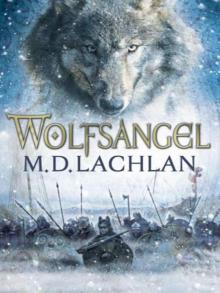 Wolfsangel
Wolfsangel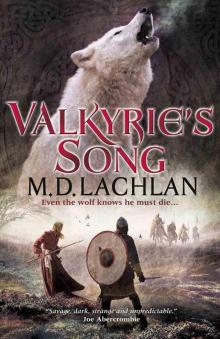 Valkyrie's Song
Valkyrie's Song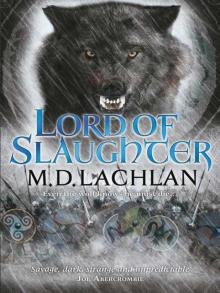 Lord of Slaughter
Lord of Slaughter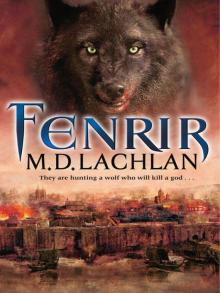 Fenrir c-2
Fenrir c-2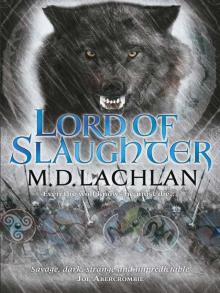 Lord of Slaughter (Claw Trilogy 3)
Lord of Slaughter (Claw Trilogy 3)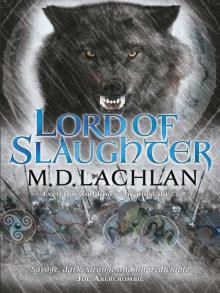 Lord of Slaughter c-3
Lord of Slaughter c-3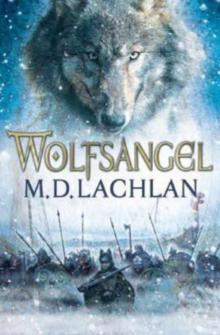 Wolfsangel c-1
Wolfsangel c-1